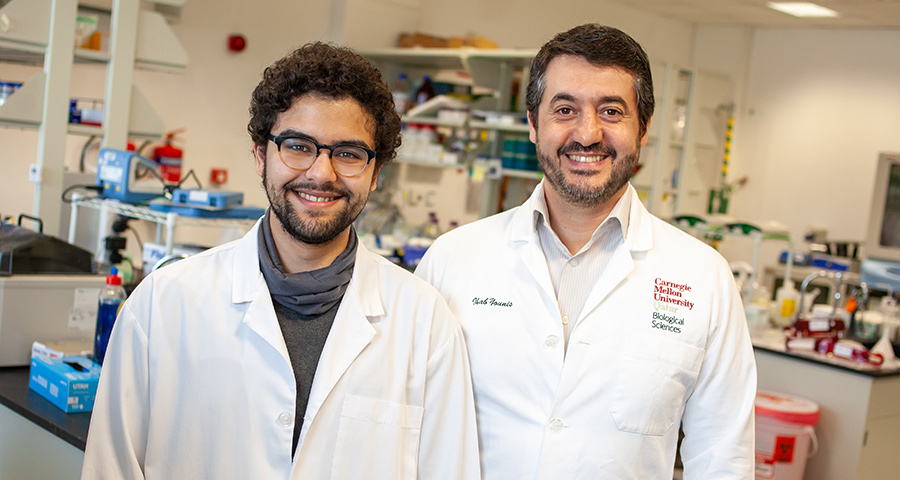
Carnegie Mellon Qatar discovers new avenue of investigation for breast cancer therapy
A team of researchers at Carnegie Mellon University in Qatar (CMU-Q) has discovered a new area of research that could lead to more effective breast cancer treatment with fewer side effects. Ihab Younis, assistant professor of biological sciences, and Ettaib El Marabti, a 2017 graduate of CMU-Q’s Biological Sciences Program, authored a paper in Frontiers in Molecular Biosciencestitled: “The cancer spliceome: Reprogramming of alternative splicing in cancer.”
Michael Trick, dean of CMU-Q, commented, “Carnegie Mellon as an institution is built on the belief that research should have an impact on people’s lives. Ihab and Ettaib’s research could have important implications in the treatment of breast cancer, as well as other types of cancers. We are interested to see how these findings improve the therapeutic options for doctors and the quality of life for patients who are undergoing treatment.”
The paper outlines how a cellular mechanism called splicing is different in cancer cells than in normal cells. The mechanism occurs as the cell translates the genetic code into the proteins it needs to function. In normal cells, splicing acts like a switch to turn on certain protein production, but this does not work properly in cancer cells. Younis and El Marabti believe that targeting cells with the faulty splicing mechanism could be one way to kill cancer cells while leaving healthy cells intact.
“We do not suggest the use of this type of therapy would replace traditional therapies,” said Younis. “Rather, targeting the cells in this way would work in combination for more effective treatment with fewer unfavorable side effects.”
Project inspired student’s passion for cancer research
When he joined the CMU-Q faculty in 2015, Younis turned to his students to help him establish a research lab; El Marabti, who was then a third-year student, was given the task of analyzing the sequence of the genetic codes of normal and cancerous cells.
“I learned that I love research because of this project with Dr. Younis,” said El Marabti.
The project continued and grew, and in 2017, El Marabti presented his findings at the Keystone Symposium on mRNA Processing and Human Disease in New Mexico, USA, as well as CMU-Q’s research symposium, Meeting of the Minds. El Marabti took the top prize at Meeting of the Minds 2017.
After his graduation from CMU-Q in 2017, El Marabti began medical school at Weill Cornell Medicine-Qatar. The paper in Frontiers in Molecular Bioscienceswas completed while El Marabti was a first-year medical student.
“Every time I ask him to help, he has always been more than generous with his time,” said Younis. “He finishes his day at Weill Cornell and comes here to work on the computational parts of the project.”
El Marabti intends to incorporate research into his career as a physician. “I spent the summer doing research at Memorial Sloane Kettering working in a similar area. I’m not sure what field I would like to pursue when I finish medical school, perhaps oncology, but I know that research will be a part of my career.”
Carnegie Mellon University in Qatar offers undergraduate degree programs in biological sciences, business administration, computational biology, computer science and information systems. Students are encouraged to participate in research to hone their skills in creative problem solving and scientific inquiry.
